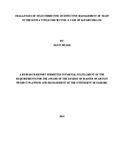| dc.description.abstract | Virtual working arrangements, including telecommuting, are on the increase globally due to the
challenges that organisations face in the current global economy. Virtual working arrangements
present considerable possible benefits to organisations, employees and the community at large if
correctly implemented. In Kenya this organisational form is not well documented or
implemented. As a result, local organisations are unaware of the employee benefits and
challenges that will be faced when implementing a telecommuting programme. Management of
virtual teams comes with its own unique challenges and opportunities. This study explored
virtual teams, their benefits and challenges faced by management and suggested possible
solutions to these challenges. The target population comprised of the organization's middle level
management based at the head office in Westlands Nairobi. The population for this study
consisted of 61 members, however in view of the target population, it was more appropriate to
treat the population as a study goup. The research design of this study was descriptive survey.
The research adopted a questionnaire for the middle managers and an interview guide for the
senior managers as instruments for data collection. Instrument's validity was checked by use of
content validity. Cronbach alpha method was used to affirm the reliability of the instrument.
Data was analyzed through organizing responses in the themes as per the objectives of the study.
The study found that shared understanding and top level management commitment to
implementing telecommuting helped virtual team performances. Different national backgrounds
and culture had less impact on the performance of virtual teams. The study also found that
consultations were made between employees and the management on who was to
telecommunicate. It also revealed that email and phone conversations and chatting were put into
great use by the middle level managers to ensure communications with remote workers were
effective. The study recommended that organizations should develop policy guidelines outlining
the risks associated with telecommuting hence emphasize on the importance of securing sensitive
information stored on the devices used and provide recommendations for selecting,
implementing and maintaining the necessary security controls. It was further recommended that
managers should be trained on the use of this technology before they are requested to manage
staff involved in telecommuting and that workers too should be involved in information systems
security training. Finally the study recommended that management should work together with
employees to ensure they fully promote teamwork and build trust amongst themselves with a
view of optimising the output of telecommuting staff. | en_US |

